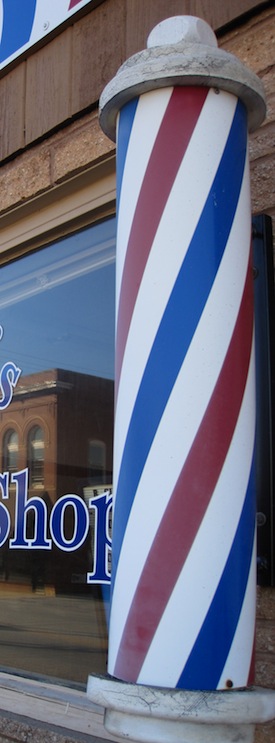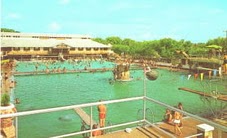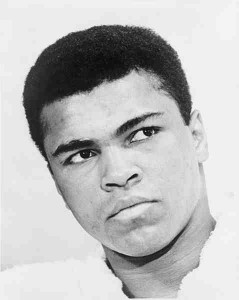 As I have reflected on those days growing up in the barber shop, it has been fun to romanticize the experience; the wide-eyed wonder of being a boy privileged to hang out in the town “man-cave” has taken me to very vivid recollections. Heck, I’ve managed to charm myself. However, I’m not particularly comfortable or proud of some parts.
As I have reflected on those days growing up in the barber shop, it has been fun to romanticize the experience; the wide-eyed wonder of being a boy privileged to hang out in the town “man-cave” has taken me to very vivid recollections. Heck, I’ve managed to charm myself. However, I’m not particularly comfortable or proud of some parts.
This day I reflect on barbershop conversations exactly 45 years ago this month.
History note – June 11, 1966 – Police arrest 22 of about 200 protesters picketing Doe Doe Recreation Park, a private, segregated amusement park with a swimming pool in Lawton.
One of the most wonderful places I went to as a boy was Doe Doe Park. The swimming pool was huge. It had swings, and a tower and multiple diving boards. In 1966 this place was pristine, especially in comparison to all the dirty cow ponds, shallow creeks and muddy lakes most of us were accustomed to. There were no swimming pools in Apache.
I remember Doe Doe Park fondly. I remember that it was for white only. Sadly, that didn’t bother me; it was the world as I knew it.

In the barber shop men talked about the “Negroes trying to swim with the whites.” I remember one person referring to some “uppity coloreds causing trouble down at Doe Doe Park.” Apparently some “Northerners” were involved, whatever that meant; I pictured arrogant and rude people. It seemed to me that these were not good people. Now where did I get that idea as a ten year old?
Forty years later I would learn the name of one of the organizers of the Lawton protests. Her name was Clara Luper. She had marched with Dr. King in places like Selma, Alabama and the epic March on Washington in 1963. Clara also marched in Lawton, Oklahoma. History was unfolding before my eyes back in 1966, and I comprehended it not.

Clara died last week; she was lauded in our state, correctly so, as a hero.
History note – June 16-18, 1966: Protesters march from the Capitol in Oklahoma City to the park, riding in a caravan of cars for part of the way and walking the rest. The march ends with a large protest at the park and a pledge from Lawton Mayor Wayne Gilley to open negotiations.
Men came and went with all sorts of opinions and solutions. The protests in Lawton were becoming big news. Cloaked in jokes, slurs and inferences, there were some pretty hideous things said. As with most things political or highly argumentative, my dad was pretty much silent on the subject. Dad was pretty good at changing the subject and using humor to guide conversations to more light-hearted topics.
I suppose I am most saddened that I don’t recall anyone speaking to the injustice of the matter. No one owned the slightest minutia of the real issue: racism. Just twenty minutes away Americans were blatantly discriminated against because of the color of their skin.
“Ah, what are you gonna do? It’s unnatural to mix the races.” This was the local sentiment. And besides, it really wasn’t our problem.
For me it was easy to be indifferent and unsympathetic because I personally didn’t know a black person. Well, I take that back. Mack Williams was one of the older guys in high school. He was black and everybody seemed to like him. I remember where the Williams family lived, something of a shack just a couple of miles north of Apache. And I remember they were poor. Really poor.
History note – June, 1966 – Two years after President Johnson signed the Civil Rights Act of 1964, blacks were still not allowed admission to Doe Doe Park. The argument was that a privately owned operation could legally deny entrance to anyone.
Ft. Sill was populated with many soldiers training for battle in Vietnam. While Coree Steel’s husband was fighting for liberty and justice half way around the world, she could not take her son to Doe Doe Park. White wives and white children could swim there. Black families like the Steels could not.
Yes, I did know a black person. His name was Mack Williams. He was number 23 on the football team and he was really good. At age ten I didn’t connect the dots. It hadn’t dawned on me that the march in Lawton was for Mack. Mack should be able to swim at Doe Doe Park if he wanted.
History note – a barber shop in Apache, 1966 – In the midst of what was an apparent indifference to the plight of the black man, there sat Mack Williams one afternoon in Caldwell Barber Shop. Mack was a shy teenager. Mack was the only black kid in the whole school. The whole town. These many years later I become melancholy as I try to imagine how alone Mack must have felt in Apache. Oh sure he had friends, but he wasn’t equal.
In the summer of 1966 Mack Williams sat in my dad’s barber shop staring out the store front windows.
There was a buzz in town because the Apache Fair was opening. The carnival people had arrived and assembled a Ferris wheel plus several other rides. There would be games, snow cones, cotton candy and the Jaycees’ dunk tank. But not for Mack Williams. He didn’t have two nickels to rub together. So he sat watching cars go up and down the main street. He watched others going in and out of stores and he watched all the white people make plans for a night down at the city park, having fun with all the other white people. Mack also watched teenagers set dates and anticipate a ride on the Ferris wheel, maybe holding hands with that date.
Mack didn’t feel sorry for himself. He was an even tempered guy who had accepted this particular lot in life. He didn’t expect anything; therefore he was not disappointed when that was exactly what he got.
But lest you think that beautiful flicker of grace, that divine appointment would not appear this day, think again. That afternoon one customer paid my dad $1.50 for a haircut. Then, he took a five dollar bill, walked over to Mack and handed it to him. “You go have a good time at the fair,” said the man.
In Apache, five dollars would go a long, long ways. I have no doubt that Mack had a great time at the fair. That was a lot of money.
Sometime later I think Mack dropped out of school. One guy said he “flunked out” and it was believable. He certainly wouldn’t have been the first. Sometime later I heard that Mack got drafted.
A Racist, Me?
I was a kid-racist and didn’t know it. A cocktail of ignorance, convention, and accepted practice poisoned me. To my parent’s credit, they expressed no ill will toward the black man. They, like most folks were passive on the topic, and that is for all of us, an indictment.
“There may be times when we are powerless to prevent injustice, but there must never be a time when we fail to protest.” ~ Elie Wiesel (Nobel Laureate and Holocaust Survivor)
It would be fair to this Barber Shop Theology piece to discuss the influence of Christian missionaries from Britain who incited key parts of the abolitionist movement in America. It would also serve my article to recount the life and ministry of Dietrich Bonhoeffer. Instead I will conclude by citing a quote from a man who was the object of much disdain in my little world.
Conversion in Seven Words – The line, seven words, that shattered the vase holding my prejudice, came from Cassius Clay: a brash, loud-mouthed boxer who changed to a “foreign religion” and wouldn’t serve his country when drafted.

I realize now that I had plenty of my own opinions. I believed there were many reasons to dislike Muhammad Ali. The big reasons had nothing to do with his skin color. He was arrogant, a braggart and in my view, unpatriotic. At age ten I believed in America and that this nation and its president could not be wrong.
The hippie anti-war protesters were all dopers and Muhammad Ali had been duped by a non-Christian religion. We had to stand up and fight against communism and Ali should do his part like everybody else. And then, a few years later, I heard those seven words from Ali…
“No Vietcong ever called me nigger.”
The light came on! Around the world all Americans were, well — Americans. But that wasn’t necessarily in Apache or Lawton. To be more specific, it wasn’t so in my own mind. Forget about Doe Doe Park, I had to integrate my own thinking. Integration came about in a very important place… a little six inch space between my ears.
The True and Better Integrator
Here is my servant whom I have chosen, the one I love, in whom I delight; I will put my Spirit on him, and he will proclaim justice to the nations. Matthew 12:18
Since committing my life to Jesus Christ, I have been learning His plan for justice. We can pray, “Let justice roll down like waters,” and pray for the courage to do something about it. This is the work of Christ, tearing down the walls that separate us. His is the work of justice.
History note – June 28, 1968 — Mack Williams was killed in Viet Nam. We all believed he was defending our freedom.
Wonderful article!
I was a few years younger than you, but I still remember many of the things that you and others have posted here. My grandparents lived in Lawton, and had since the early 40’s, and my folks and I lived there for a short while in the late 60’s. My parents and grandparents never cared much for Doe Doe Park. I only went once, with some friends, and I remember my mother being not too happy about my having been there. I never really understood why they couldn’t see that it was about the most wonderful place in the world.
All these years later, the mere thought of Doe Doe Park always brought a strange tension, as if something was wrong, but I never knew what. You helped connect some dots for me, and things make more sense. Thank you for sharing!
Tdy / ft sill 1966 w/ some ndn friends n th military denied entry to doe doe !
We moved to Lawton in 59…I was 6. I remember spending many really great days at Doe Doe Parks pool. I took swim lessons there in the 3rd grade. We moved to Tulsa in 64 when it all happened. I watched the news on TV and saw the place I spent so many wonderful summer days swimming, listening to music and looking at girls. I remember the signs as you came into the swimming pool overhead one after another in that chainlink corridor. One said, and I may have the order wrong, “Regulation swim suits only, no cut offs!”, “Everyone must shower before entering pool area!”, “No open sores in the pool area”, “No glass containers or food in the pool area!” and “No n—–s allowed!” I saw that sign every time I went there and never really thought much about it until the march…seeing all those people was when I realized what that sign was really about. It is a memory I’d like to erase at times…and yet it is important not to forget how things were. You said it very well…it is an indictment.
excellent article. I was at Doe Doe Park during the protests wondering what was going on……too young to know how ignorant I was….
Brenda, We were both too young to understand! This article was indeed great. Of course, we went to Will Rogers and the school and athletics were already integrated. Our friends were both black and white and we didn’t understand anything other than the rules were the rules.
I had a lot of fun at Doe Doe Park pool and at the skating rink that was on site there as well. I remember when the challenge was to be able to swim well enough to swim out to the tower or going skating and eating those big dill pickles and drinking dill pickle juice over crushed ice! Those were the days!!!
Great article. I was a little girl attending Sunday school in Apache about this time frame, just a tiny pre-schooler. I loved reading. It restores some of my faith in Christianity. Thanks.